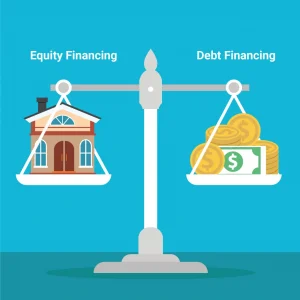Navigating the financial landscape to secure funding is critical for any business looking to expand, innovate, or simply keep the lights on. A pivotal decision in this journey involves choosing between debt and equity financing.
So, what is the difference between debt financing and equity financing?
Debt financing allows businesses to borrow money that must be repaid over time, with interest but lets them retain full ownership and control. On the other hand, equity financing involves raising capital by selling company shares, thereby sharing ownership, potential profits, and decision-making power with investors. Deciding which route to take requires a deep dive into the nuances of both options and understanding their implications on a business’s cash flow, tax obligations, and long-term growth potential.

What is Debt Financing?
Debt financing is a cornerstone in business finance, offering a straightforward yet critical pathway for companies to access the capital needed for growth, operations, or expansion. By borrowing money through mechanisms like loans, businesses commit to repaying the principal amount along with interest over a predetermined period.
This form of financing is often favored for its structure and predictability, allowing businesses to plan and forecast their financial commitments accurately. While it’s a common route, debt financing has its caveats. It can restrict a company’s operations, limiting its ability to pivot or explore opportunities beyond its primary focus, as lenders may set conditions to safeguard their investments.
The allure of debt financing lies in its several advantages. Foremost is the preservation of control; unlike equity financing, lenders have no say in the company’s decisions or operations beyond the conditions of the loan. This autonomy is a significant draw for many businesses.
Additionally, the tax deductibility of interest payments presents a financial benefit, reducing the net cost of borrowing. The predictability of loan repayments further adds to its appeal, enabling precise budgeting and financial planning. However, the benefits come alongside the responsibility to meet regular payments, which could strain finances during downturns or slower-than-anticipated growth periods.
However, the path of debt financing is full of challenges, particularly in times of economic uncertainty or when a business doesn’t perform as expected. Regular repayments become a fixed expense, potentially hindering growth by diverting funds from operational improvements or expansion efforts. For businesses structured as limited liability companies (LLCs) or similar entities, personal financial risk may loom large, as lenders often require personal guarantees against the loan.
This intertwines personal financial health with the company’s fortunes, raising the borrowing stakes. Recognizing these challenges, programs offered by the U.S. Small Business Administration (SBA), which guarantees loans through participating banks, can mitigate some risks, making debt financing a more accessible option for small businesses navigating the complexities of growth and expansion.

What is Equity Financing?
Equity financing represents a fundamental shift in a company’s ownership structure in exchange for vital capital, diverging significantly from the traditional debt financing model. When a business, such as Company XYZ, opts for equity financing, it essentially sells a portion of its ownership to investors to secure funds necessary for expansion or other significant initiatives.
For instance, if the owner decides to relinquish 10% of the company, the investor who purchases that stake provides the needed capital and acquires a say in the company’s future decisions. This method of financing is particularly appealing because it is non-repayable, offering a unique advantage over debt financing, where periodic repayments and interest are mandatory.
The primary allure of equity financing lies in its ability to inject capital into a business without imposing the burden of direct financial repayment. Unlike debt financing, which can strain a company’s cash flow due to regular interest and principal payments, equity financing provides a pool of funds with no immediate obligation for repayment.
This characteristic allows businesses to channel more resources into growth and operational enhancements, potentially accelerating their expansion and market reach without the constant pressure of debt servicing.
However, the benefits of equity financing come with significant trade-offs. The most prominent is the dilution of ownership; accepting capital from investors means giving up a share of the company’s equity, which translates to shared profits and a necessity to include these investors in key business decisions. This can lead to potential conflicts in vision and strategy, especially if the investors’ goals diverge from those of the original owners.
Moreover, regaining full ownership requires buying out investors, often at a much higher cost than the initial investment. This complexity introduces a critical consideration for businesses contemplating equity financing as a pathway to growth, balancing the need for capital against the desire for control and independence.
Equity Financing vs. Debt Financing Overview
The primary difference between debt and equity financing lies in the ownership and repayment structure. Debt financing requires repayment regardless of the business’s financial status, posing a risk of cash flow strain. Equity financing, however, trades capital for ownership, potentially diluting control without the repayment obligation.
Repayment
Debt financing requires businesses to make set monthly or weekly payments until the loan is fully repaid. In contrast, equity financing does not impose a repayment schedule on the business. Instead, investors receive a portion of the business’s profits, aligning their return directly with the company’s performance.
Qualifying for the Financing
To qualify for debt financing, businesses must typically demonstrate strong financials and the business owner might need a good personal credit score. Equity financing, however, often focuses more on the business’s potential and its owners’ character and vision rather than just the current financials.
Interest
Interest payments are a defining characteristic of debt financing, adding cost to the borrowed funds. Equity financing, on the other hand, requires no interest payments. The cost here is not financial but comes as giving up a share of the business.
Business Ownership
With debt financing, entrepreneurs maintain full ownership of their business, as the financing does not involve selling company equity. Equity financing requires business owners to trade a percentage of their business ownership in exchange for capital, potentially diluting their control and profit share.
Lenders
Debt financing is commonly available from traditional sources such as banks, credit unions, online lenders, and some nonprofit lenders, offering a variety of terms and conditions. Equity financing sources include angel investors, crowdfunding platforms, and venture capital firms, each providing different levels of investment, involvement, and expertise.

Equity Financing and Debt Financing Example
In its quest for expansion, Company XYZ finds itself at a crossroads, needing to secure $50 million to build new factories and acquire new equipment. To navigate this financial challenge, the company opts for a balanced approach, combining equity and debt financing to fuel its growth. Company XYZ embarks on equity financing by selling a 25% stake for $30 million to a private investor, inviting an external party to share in its future profits and decisions.
Simultaneously, it leverages debt financing by securing a $20 million loan at a 3% interest rate from a bank, committing to a repayment plan over three years. This dual strategy exemplifies a nuanced approach to raising capital, each component bringing unique benefits and obligations to the company’s financial structure.
The scenario highlights the flexibility within financing strategies, where the equity and debt financing mix can significantly influence a company’s future. Choosing a sole equity financing route would necessitate Company XYZ giving up a larger portion of its ownership. This would mean a greater dilution of the founders’ equity, impacting their control over the company and their share of future profits. Such a decision trades immediate financial relief for a long-term sharing of the company’s successes, a crucial consideration for any business contemplating equity financing.
Alternatively, relying entirely on debt financing poses different challenges and benefits for Company XYZ. This route would increase its monthly financial obligations due to loan repayments, potentially straining its cash flow and limiting flexibility in other investments or operational expenses.
However, it also allows the company to retain full ownership and control, avoiding the dilution of equity accompanying equity financing. The higher immediate financial burden of debt repayments comes with the long-term benefit of maintaining greater control over the company’s direction and profits.
Deciding between equity financing, debt financing, or a blend of both requires a deep understanding of a company’s financial health, future growth prospects, and tolerance for sharing control and profits with others. Company XYZ’s choice illustrates a strategic compromise, balancing the immediate benefits of cash influx against the long-term implications on ownership, control, and financial obligations. Businesses must carefully consider their position and objectives to determine the most advantageous financing mix for their specific needs and circumstances.
Why Would a Company Choose Debt Over Equity Financing?
Companies might prefer debt financing for several reasons, including the desire to retain full ownership and control over the business. Debt financing can also be more attractive for businesses with stable cash flows and the ability to comfortably meet repayment schedules, as it is often less costly than equity financing due to the interest tax shield.
When to Choose Debt Financing Vs. Equity Financing
The decision between debt and equity financing hinges on various factors, including the company’s financial health, growth stage, and risk tolerance. Debt financing might be more suitable for established businesses with stable revenues. In contrast, equity financing could be better for startups and high-growth companies that can afford to trade ownership for the chance to scale rapidly without the burden of debt.
Debt Financing Considerations
- Eligibility Challenges: Securing a business loan can be challenging, especially for newly established businesses seeking funds. Requirements often include a minimum operational period, satisfactory credit, robust financial statements, and collateral. Meeting these criteria could secure you a favorable interest rate.
- Anticipating Returns: Opting for a loan can be beneficial if you have a clear plan for the loan’s use and anticipate returns that exceed the interest costs. Additionally, timely debt repayment can enhance your business credit, potentially leading to more favorable borrowing terms later.
- Risk Assessment: Using collateral means risking that asset should you fail to meet loan repayments. Unsecured loans might not require collateral, but your credit rating and personal assets, such as your home or vehicle, might be vulnerable if a personal guarantee is part of the loan agreement.
- Financial Optimization: Over time, debt financing might offer greater financial advantages than equity financing. With equity financing, investors are entitled to a share of the profits and a portion of the sale proceeds if you sell the company, diluting your potential earnings.
Equity Financing Considerations
- Debt Avoidance: If avoiding debt is a priority, equity financing could be the safer route. Unlike loans, it doesn’t require repayment or put collateral at risk, and it eliminates the pressure of regular repayments on your cash flow, facilitating growth.
- Suitability for Startups: Equity financing might be the only option for startups or businesses not yet turning a profit if qualifying for a loan is out of reach. Ensuring any equity investment reflects a fair valuation of your young business is crucial.
- Seeking Partnerships: Beyond capital, investors can offer invaluable industry insight and mentorship, contributing significantly to your business’s development and success, particularly if they are actively involved.
- Control Considerations: Accepting equity investment means sharing control. Investors with significant stakes might demand voting rights or push for strategic changes like board reconfigurations. Selling more than half of your business’s equity could lead to losing control, and regaining it might require buying out investors at a high cost.

Equity Financing Options for Small Businesses
Small businesses have several avenues for equity financing, including angel investors, venture capital, and crowdfunding platforms. These options allow smaller enterprises to access capital without the stringent requirements and repayment obligations of traditional debt financing. However, they require careful consideration of the implications on ownership and control.
Venture Capital
Venture capital firms provide substantial financial investments in exchange for equity in promising startups and small businesses with high growth potential. These firms bring capital and valuable industry connections, mentorship, and business advice. However, securing venture capital can be highly competitive, with firms typically seeking businesses that can provide significant returns on their investment.
Angel Investors
Angel investors are affluent individuals who offer capital to startups and small businesses, often in the early stages, in exchange for ownership equity or convertible debt. Unlike venture capitalists, angel investors may provide smaller amounts of capital, making them more accessible for early-stage companies. They can also offer valuable guidance, leveraging their experience and networks to support the business’s growth.
Equity Crowdfunding
Equity crowdfunding allows businesses to raise small amounts of money from many people, typically via online platforms. This approach democratizes investment, enabling startups and small businesses to access capital from a broad audience in exchange for equity. It’s an innovative way to fundraise, offering the dual benefit of raising capital while building a community of supporters.
Family and Friends
Raising capital through family and friends is a common and sometimes more accessible option for small businesses. This route can offer more flexible terms and lower expectations for immediate returns than professional investors. However, mixing business with personal relationships carries risks, including potential conflicts or strained relationships if the business doesn’t perform as expected.
Debt Financing Options for Small Businesses
Unlike equity financing, debt financing means borrowing money that must be paid back over time, typically with interest. This route allows small business owners to retain full control over their operations while accessing the funds needed for expansion, inventory, equipment, or other capital needs.
Term Loans
Term loans are a traditional form of financing where a business borrows a lump sum of money upfront, which is then repaid over a set period, or term, with interest. These loans are well-suited for financing significant one-time expenses, such as purchasing major equipment or expanding facilities. They offer the predictability of fixed monthly payments and can have variable or fixed interest rates.
Business Lines of Credit
A business line of credit provides flexibility that a traditional term loan cannot. It allows businesses to draw funds up to a certain limit as needed, making it an excellent option for managing cash flow and unexpected expenses. Interest is only paid on the amount drawn, making it a cost-effective option for many small businesses.
Invoice Factoring
Invoice factoring is a financial service where businesses sell their accounts receivable (invoices) to a third party (a factor) at a discount. This provides immediate cash flow to the business, which can be crucial for operations and growth. It’s particularly useful for businesses that have long invoice payment cycles.
Personal Loans for Business
Personal loans can be used for business purposes for new businesses or those unable to qualify for traditional business loans. While these loans are based on the individual’s creditworthiness, not the business’s, they can provide essential startup capital. However, it’s important to consider the implications of mixing personal and business finances.
Business Credit Cards
Business credit cards offer a convenient way to manage expenses, offering the flexibility to pay for costs over time. In addition to providing a line of credit, they can offer rewards, such as cashback or travel points, which can benefit the business. However, interest rates can be high, so they’re best used for short-term financing needs.

Final Words
So, What is the Difference Between Debt Financing and Equity Financing? This choice greatly influences a company’s future, affecting everything from ownership structure to financial flexibility. By comprehensively grasping the differences and consequences of each financing avenue, businesses can tailor their approach to funding to harmonize with their overarching goals, ensuring a well-rounded strategy for capital acquisition.
Visit us at EduCounting for an in-depth exploration of the Difference Between Debt and Equity Financing. Our blog offers rich insights and practical advice to help you navigate the complexities of business financing, empowering you to make informed decisions that align with your company’s long-term vision.
FAQs
When Should I Choose Equity Financing?
Equity financing is suitable when you need funds without the pressure of repayments, especially if you’re okay with sharing ownership. It’s ideal for startups and high-growth companies needing capital and expertise from investors.
When Should I Choose Debt Financing?
Choose debt financing if you prefer to keep full ownership and can afford regular loan repayments. It’s best for established businesses with predictable revenue streams.
What are the advantages of using debt financing instead of equity financing?
Debt financing’s main advantage is controlling your business and potential tax benefits from interest payments. It eliminates the need to share profits or decision-making power.
What is the major advantage of debt financing?
The major advantage is the ability to maintain complete control and ownership of the company, making it an attractive option for businesses confident in their revenue and repayment capabilities.









